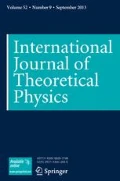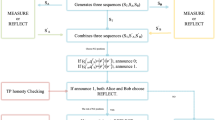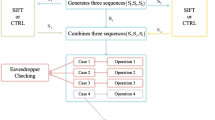Abstract
We propose a secure quantum protocol for comparing the equality of information with the help of a semi-honest third party (Trent). Our protocol utilizes the triplet W states, and the single-particle measurement. The technique for preparing W state is mature, which ensures the utility of our protocol. The security of our protocol with respect to both outsider attack and participant attack is discussed. Any information about the private information, the comparison result will not be leaked out, even the third party cannot know these information.
Similar content being viewed by others
References
Bennett, C.H., Brassard, G.: Quantum cryptography: public-key distribution and coin tossing. In: IEEE International Conference on Computers, Systems and Signal Processing, Bangalore, India, pp. 175–179. IEEE Press, New York (1984)
Ekert, A.K.: Quantum cryptography based on Bell theorem. Phys. Rev. Lett. 67(6), 661–663 (1991)
Bennett, C.H.: Quantum cryptography using any two nonorthogonal states. Phys. Rev. Lett. 68(21), 3121–3124 (1992)
Liu, B., Gao, F., Wen, Q.Y.: Single-photon multiparty quantum cryptographic protocols with collective detection. IEEE J. Quantum Electron. 47, 1389–1390 (2011)
Hillery, M., Buzěk, V., Berthiaume, A.: Quantum secret sharing. Phys. Rev. A 59, 1829–1834 (1999)
Boström, K., Felbinger, T.: Deterministic secure direct communication using entanglement. Phys. Rev. Lett. 89, 187902 (2002)
Deng, F.G., Long, G.L., Liu, X.S.: Two-step quantum direct communication protocol using the Einstein-Podolsky-Rosen pair block. Phys. Rev. A 68, 042317 (2003)
Lin, S., Wen, Q.Y., Gao, F., Zhu, F.C.: Quantum secure direct communication with chi-type entangled states. Phys. Rev. A 78, 064304 (2008)
Zhang, W.-W., Gao, F., Liu, B., et al.: A watermark strategy for quantum images based on quantum Fourier transform. Quantum Inf. Process. (2012). doi:10.1007/s11128-012-0423-6
Zhang, W.-W., Gao, F., Liu, B., et al.: A quantum watermark protocol. Int. J. Theor. Phys. (2012). doi:10.1007/s10773-012-1354-9
Yao, A.C.: Protocols for secure computations. In: Proceedings of 23rd IEEE Symposium on Foundations of Computer Science, FOCS’82, Washington, DC, USA, p. 160 (1982)
Boudot, F., Schoenmakers, B., Traore, J.: A fair and efficient solution to the socialist millionaires’ problem. Discrete Appl. Math. 111(1–2), 23–36 (2001) (Special Issue on Coding and Cryptology)
Lo, H.K.: Insecurity of quantum secure computations. Phys. Rev. A 56(2), 1154–1162 (1997)
Yang, Y.G., Wen, Q.Y.: An efficient two-party quantum private comparison protocol with decoy photons and two-photon entanglement. J. Phys. A, Math. Theor. 42, 055305 (2009)
Yang, Y.G., Cao, W.F., Wen, Q.Y.: Secure quantum private comparison. Phys. Scr. 80(6), 065002 (2009)
Chen, X.-B., Xu, G., Niu, X.-X., Wen, Q.-Y., Yang, Y.-X.: An efficient protocol for the private comparison of equal information based on the triplet entangled state and single-particle measurement. Opt. Commun. 283, 1561–1565 (2010)
Liu, W., Wang, Y.-B., Jiang, Z.-T.: An efficient protocol for the quantum private comparison of equality with W state. Opt. Commun. 284, 3160–3163 (2011)
Liu, W., Wang, Y.-B., Cui, W.: Quantum private comparison protocol based on Bell entangled states. Commun. Theor. Phys. 57, 583–588 (2012)
Liu, W., Wang, Y.-B., Jiang, Z.-T., Cao, Y.-Z.: A protocol for the quantum private comparison of equality with χ-type state. Int. J. Theor. Phys. 51, 69–77 (2012)
Liu, W., Wang, Y.-B., Jiang, Z.-T., Cao, Y.-Z., Cui, W.: New quantum private comparison protocol using χ-type state. Int. J. Theor. Phys. 51, 1953–1960 (2012)
Liu, W., Wang, Y.-B.: Quantum private comparison based on GHZ entangled states. Int. J. Theor. Phys. (2012). doi:10.1007/s10773-012-1246-z
Jia, H.-Y., Wen, Q.-Y., Li, Y.-B., Gao, F.: Quantum private comparison using genuine four-particle entangled states. Int. J. Theor. Phys. 51, 1187–1194 (2012)
Liu, B., Gao, F., Jia, H.-y., Huang, W., Zhang, W.-w., Wen, Q.-y.: Efficient quantum private comparison employing single photons and collective detection. Quantum Inf. Process. (2012). doi:10.1007/s11128-012-0439-y
Tseng, H.-Y., Lin, J., Hwang, T.: New quantum private comparison protocol using EPR pairs. Quantum Inf. Process. 11, 373–384 (2012)
Yang, Y.-G., Xia, J., Jia, X., Zhang, H.: Comment on “quantum private comparison protocols with a semi-honest third party”. Quantum Inf. Process. (2012). doi:10.1007/s11128-012-0433-4
Zhang, W.-W., Zhang, K.-J.: Cryptanalysis and improvement of the quantum private comparison protocol with semi-honest third party. Quantum Inf. Process. (2012). doi:10.1007/s11128-012-0507-3
Dür, W., Vidal, G., Cirac, J.I.: Three qubits can be entangled in two inequivalent ways. Phys. Rev. A 62, 062314 (2000)
Duan, L.M., Kimble, H.: Scalable photonic quantum computation through cavity-assisted interactions. Phys. Rev. Lett. 92, 127902 (2004)
Deng, Z.J., Feng, M., Gao, K.L.: Preparation of entangled states of four remote atomic qubits in decoherence-free subspace. Phys. Rev. A 75, 024302 (2007)
Lin, X.M., Xue, P., Chea, M.Y., et al.: Scalable preparation of multiple-particle entangled states via the cavity input–output process. Phys. Rev. A 74, 052339 (2006)
Lin, G.W., Lin, X.M., Chen, L.B., et al.: Generation of multiple-particle cluster state via cavity QED. Chin. Phys. B 17, 64 (2008)
Zheng, H.Y., Zhang, X.T., Shao, X.Q., et al.: Generation of multi-photon cluster states through the cavity input–output process. Chin. Phys. Lett. 25, 836–838 (2008)
Pan, G.-z., et al.: Generation of multi-atom entangled states through the cavity input-output process. J. Anhui Univ. Natur. Sci. Ed. 34, 5 (2010)
Joo, J., Park, Y.J.: Quantum secure communication via a W state. J. Korean Phys. Soc. 46(4), 763 (2005)
Li, Y.B., Wen, Q.Y., Gao, F., Jia, H.Y., Sun, Y.: Information leak in Liu et al.’s quantum private comparison and a new protocol. Eur. Phys. J. D 66, 110 (2012)
Long, G.L., Liu, X.S.: Theoretically efficient high-capacity quantum-key-distribution scheme. Phys. Rev. A 65, 032302 (2002)
Gao, F., Qin, S.J., Wen, Q.Y., Zhu, F.C.: A simple participant attack on the Bradler–Dusek protocol. Quantum Inf. Comput. 7, 329 (2007)
Qin, S.J., Gao, F., Wen, Q.Y., et al.: Cryptanalysis of the Hillery-Buzek-Berthiaume quantum secret-sharing protocol. Phys. Rev. A 76, 062324 (2007)
Song, T.T., Zhang, J., Gao, F., et al.: Participant attack on quantum secret sharing based on entanglement swapping. Chin. Phys. B 18, 1333 (2009)
Lin, S., Wen, Q.Y., Gao, F., et al.: Improving the security of multiparty quantum secret sharing based on the improved Bostrom-Felbinger protocol. Opt. Commun. 281, 4553 (2008)
Acknowledgements
This work is supported by NSFC (Grant Nos. 61272057, 61170270, 61100203, 61003286, 61121061), NCET (Grant No. NCET-10-0260), SRFDP (Grant No. 20090005110010), Beijing Natural Science Foundation (Grant Nos. 4112040, 4122054), the Fundamental Research Funds for the Central Universities (Grant No. 2011YB01), BUPT Excellent Ph.D. Students Foundation (Grant No. CX201325).
Author information
Authors and Affiliations
Corresponding author
Rights and permissions
About this article
Cite this article
Zhang, WW., Li, D. & Li, YB. Quantum Private Comparison Protocol with W States. Int J Theor Phys 53, 1723–1729 (2014). https://doi.org/10.1007/s10773-013-1970-z
Received:
Accepted:
Published:
Issue Date:
DOI: https://doi.org/10.1007/s10773-013-1970-z




